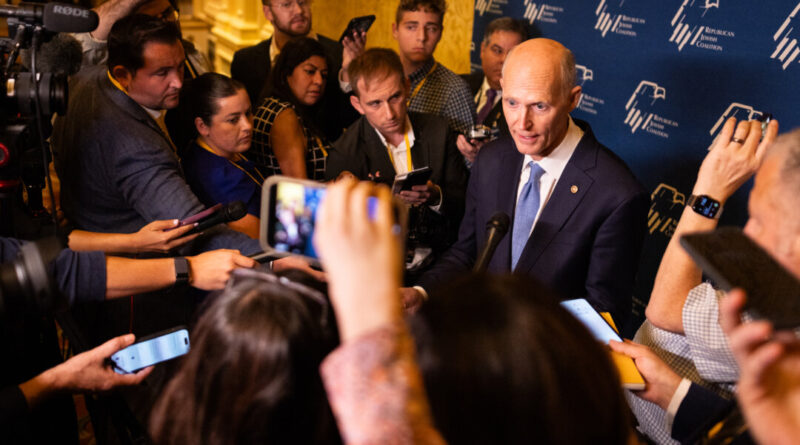Rick Scott aims to defend Florida Senate seat against Democratic challenger
While Scott has historically won his elections by narrow margins, polls and voter registration data suggest he holds an edge this year.
In a race that could determine which party controls the upper chamber of Congress in 2025, Sen. Rick Scott (R-Fla.) and former Rep. Debbie Mucarsel-Powell (D-Fla.) are going head to head for Florida’s senate seat.
Seeing the seat as a potential pickup opportunity in its path to retain Senate control, the Democratic Senatorial Campaign Committee (DSCC) announced in September that it was launching a “multimillion-dollar” television ad buy targeting Scott.
“We have a great opportunity in both Florida and Texas,” DSCC Chair Sen. Gary Peters (D-Mich) said during a CSPAN event on Sept. 26.
“Quality is part of that issue. We have two very unpopular incumbents … We have very strong challengers.”
“In the last two years, the Republican Party has been able to have to leapfrog over the Democratic Party in terms of number of registered voters, but … it doesn’t matter what kind of advantage you may have in registration if those people don’t vote,” J. Edwin Benton, a professor of political science at the University of South Florida, told The Epoch Times.
Democrats are hopeful of their chances this year, despite the registration margins, in part because Scott dethroned former Sen. Bill Nelson (D-Fla.) in 2018 by just over 10,000 votes.
Surveys from Victory Insights, Public Policy Polling, and Marist College have the two candidates neck to neck between one and two percent apart, but a poll from The New York Times/Siena College has Scott leading by 9 points.
The Cook Political Report, an election handicapper, rates the race as “likely Republican.”
There was no debate between the two candidates—who boast sharply contrasting platforms. Mucarsel-Powell had pushed for debates, but Scott was reluctant to commit to a date.
“I wouldn’t call it a safe race,” Sharon Wright Austin, a professor of political science at the University of Florida, told The Epoch Times. “The polls are showing that Scott still has an advantage and is ahead, but by a small margin.”
Florida voters also have the chance to vote on two constitutional amendments this year—one that would enshrine abortion access, Amendment 4, and another that would legalize recreational marijuana, Amendment 3—and both could have an impact on turnout, especially among female and young voters who could support Mucarsel-Powell, Austin said.
Those amendments could also drive turnout among Evangelical voters, who likely favor Scott, the professor added.
This is what’s at stake in Florida’s Senate race this year.
Governor Turned Senator
Before becoming a senator in 2019, Scott served for two terms as the 45th governor of Florida between 2011 and 2019.
By 1988, Scott had founded the Columbia Hospital Corporation, which had grown rapidly before it merged with the Hospital Corporation of America (HCA) to create Columbia/HCA Healthcare Corporation in 1994.
Three years later, the Justice Department investigated the company for alleged fraudulent charges to Medicare and Medicaid, resulting in the company’s board of directors forcing Scott’s resignation.
Raised in Missouri, Scott later moved to Florida. With the backing of the Republican Tea Party movement, he won the 2010 governor’s race, narrowly beating Democrat Alex Sink by less than one percent of the vote.
Campaign finance reports indicated Scott spent more than $73 million of his own money on that race and roughly $85 million in total.
“Scott, like every other governor, had his critics, but he didn’t experience the same level of criticism as the current governor,” Austin said.
Scott has put less money into this year’s race. He has raised roughly $40 million and has spent most of it, with slightly more than $2 million in cash on hand as of Oct. 16.
Mucarsel-Powell, by contrast, raised $31.2 million, spent $29.5 million, and has $1.7 million in cash on hand.
During a Latino American roundtable event at Trump’s resort in Miami-Doral last week, Scott acknowledged that his races have been close historically and urged voters to turnout in November.
“The Hispanic vote is the deciding factor,” Scott said.
Scott’s platform, his “12 Point Plan,” includes support for “patriotic” education in schools that rejects “critical race theory,” plans to remove race designations on state government forms, a tough-on-crime stance, and a continuation of former President Donald Trump’s border wall.
Mucarsel-Powell: Former Congresswoman
Before she became a politician, Mucarsel-Powell worked for Florida International University’s Colleges of Health and Medicine, leading a program to offer expanded health care access to state residents.
Mucarsel-Powell represented Florida’s 26th Congressional District from 2019 to 2021, which includes portions of Maimi-Dade County and the Florida Keys.
She was the first South American-born immigrant elected to Congress, after immigrating to the United States from Ecuador when she was 14 years old.
She lost her 2020 reelection bid to the then-mayor of Miami-Dade County, Republican Carlos A. Giménez.
This year, she is running on a platform targeting inflation, the rising cost of living, out-of-control home insurance premiums in Florida, and increasing job and vocational training opportunities.
Both Candidates Hold Advantages
“Republicans have an advantage because there are more Republican registered voters, but Democrats have made aggressive mobilization efforts in the state during this election cycle,” Austin said.
Murcarsel-Powell has her advantages, too.
The former congresswoman seems to be “very sociable, very outgoing” and “well-liked in her previous position,” Benton said.
The “fact that she’s a woman and she has the right policy position with regard to abortion, that could help her considerably” against Scott, who opposes Florida’s Amendment 4 to enshrine abortion access in the state constitution, the professor added.
Austin agreed.
“Her biggest advantage is that she will benefit from the increased turnout because of Amendment 4 and the Trump-Harris race. Her biggest disadvantage involves [Scott’s] greater name-recognition and incumbent status,” she said.
Scott, however, is facing an underdog who has been endorsed by prominent Democrats like former President Barack Obama.
“Either of them could win,” Austin said.





